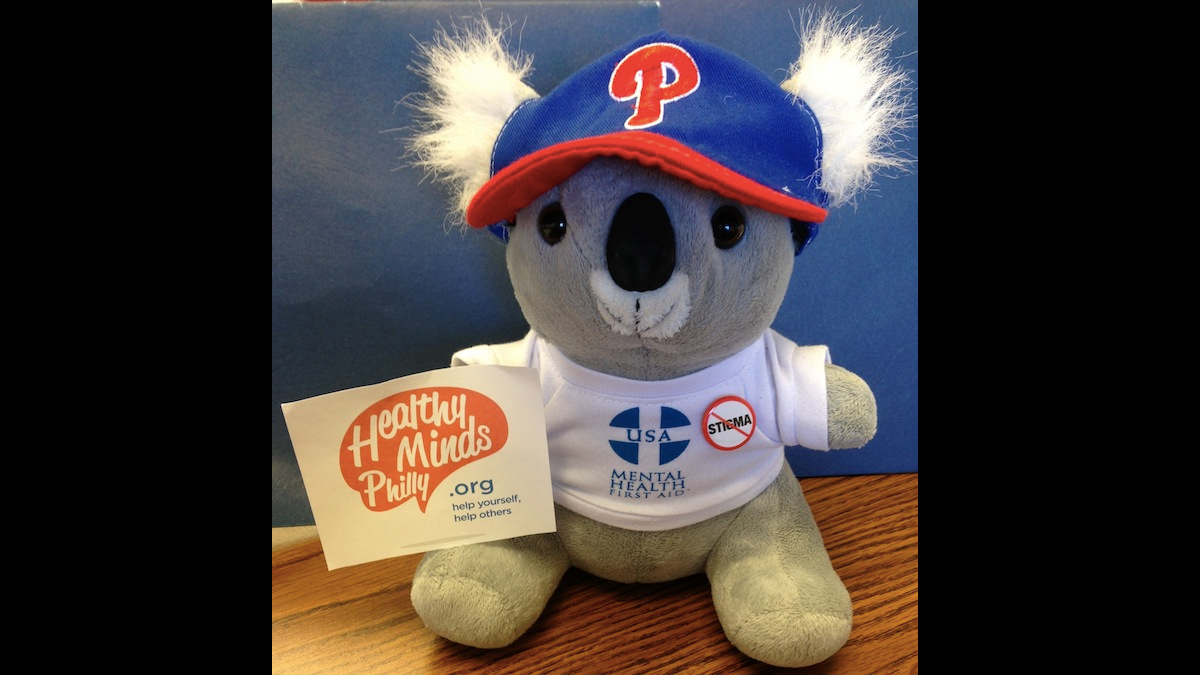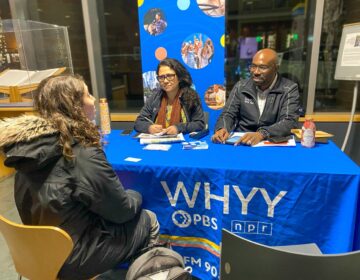Mental Health First Aid brings model of recovery and resiliency to community members

A little stuffed koala named Algee, the program's mascot, watched the class from his perch. (Michael Buozis/for NewsWorks)
The roomful of adults sit quietly in groups at tables, conferring together and drawing large pictures with colorful markers on white chart paper. The instructor, Shemiah Cooper, walks between the groups, encouraging them, as human figures form on their papers.
When the exercise ends, each group presents its creation to the whole class. There’s “Cyndy” a woman who is having “the worst day ever,” running late for an important job interview. There’s “Chuckie” who is so paralyzed by social anxiety that he won’t leave the house to buy food. And then there’s “Mitchell” a hypochondriac waiting for his doctor’s appointment.
All of the characters are fictional. But Cooper makes sure her students give each one of them a name.
“We label jars and not people,” she says. “I need the name of the individual.”
Delving into mental health
The exercise was part of an eight-hour adult Mental Health First Aid (MHFA) class at NHS Human Services in Mt. Airy conducted by Cooper over Wednesday and Thursday of last week. Cooper says she hoped the exercise would help her students identify signs and symptoms of someone suffering a mental health crisis.
The MHFA course, provided by the city’s Department of Behavioral Health and Intellectual Disability Services (DBHIDS), is free and open to members of the public who register ahead of time. Instructors teach students how to help someone in mental or emotional distress and how to determine when it’s time to seek professional help.
“Most people under-react when someone is having [mental health] problems,” says Cooper, who lives in Roxborough. “They tend to do nothing. They think, ‘This isn’t any of my business.'” This contrasts with how most people react to someone in physical distress, by overreacting with too much confidence, she says.
“The MHFA course is all about teaching people how to understand when professional help is necessary,” Cooper says. “Or, in other situations, understanding when somebody just might need someone to talk to.”
Just because someone exhibits signs or symptoms of distress, doesn’t necessarily mean they have a disorder like anxiety or depression, Cooper says. “It has to impact your ability to live, laugh and love,” she says.
A crisis plan
MHFA students learn to engage in a mental health action plan when confronted with someone in crisis, using the mnemonic device ALGEE:
• Assess for risk of suicide or harm.• Listen nonjudgmentally.• Give reassurance and information.• Encourage appropriate professional help.• Encourage self-help and other support strategies.
A little stuffed koala named Algee, the program’s mascot, watched the class from his perch in front of Cooper’s computer.
The 14 students taking this week’s course at NHS join a growing number of citizens certified by MHFA. Jennifer Sears, director of MHFA in Philadelphia, says at least 5,500 have been certified in the city in 310 trainings since the program started in Jan. 2012.
Changing the landscape
“MHFA is going to change the landscape of behavioral health,” Sears says. “The whole system is going through a transformation, moving to a recovery and resiliency model and away from a model of illness and diagnosis.”MHFA has certified around 500 Philadelphia School District police and 200 other school district staff members, as well as employees of the fire department, new police recruits and new hires at the Department of Human Services.
But, Sears and Cooper stress, all are welcome. MHFA offers three certifications: One for all adult members of the public, another for public safety workers and another for professionals who work with children.
Before joining MHFA, Shemiah Cooper worked with children with autism and as a case manager for adults with mental health and intellectual disabilities. She brings humor and collegiality into the classroom, joking with her students about overcoming her own fear of public speaking. But every chance she gets, Cooper reminds the class what mental health first aid is all about — public service.
“We’re taking ‘us’ out of the equation,” she says. “It’s not about you.”
She’s also realistic about what an MHFA certification can help her students achieve. “We’re all about people being able to live life on life’s terms,” she says. “It’s not about getting rid of symptoms.”
Everyday applications
Kiasha Huling, director of social health services at the Sayre Health Center in West Philadelphia, already completed the youth MHFA certification when she registered for the adult course at NHS this week. Huling says she wanted to experience the adult course before she recommended it to her colleagues.
“For a professional, it’s probably redundant,” says Huling. “But I think it’s perfect for people who will deal these issues in their everyday lives — camp counselors, family matriarchs, other people in the community.”
Frank Algarin, also certified by MHFA, says the skills he developed in the course help him in his day-to-day duties working in the behavioral health field. Recently, when a man threatened people in the lobby of the office where Algarin works, Algarin was able to diffuse the situation by talking to the man on his level. He listened, heard the man say he was hungry and brought him a few bags of crackers.
“I knew where he was coming from. I was in trouble before,” Algarin says. This simple act of understanding helped him calm the man down.Those interested in registering for an MHFA course can visit their website.
WHYY is your source for fact-based, in-depth journalism and information. As a nonprofit organization, we rely on financial support from readers like you. Please give today.





